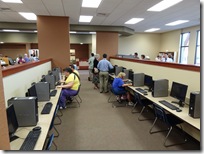The Public Library as an Institution
“The library, like other institutions, is not an isolated and independent structure. It is organically related to the rest of society and, therefore, it is influenced by many social forces, including the distribution of the population, wealth, economic trends, taxation methods, trading areas, improved communication and transportation, the increased mechanization and the resulting leisure, and the trend toward regionalism. The development of the library as an institution appears meaningful only when its development is related to the impact of these social forces…”
“If the effectiveness of the library as a social institution is to be increased, library development in the future must be planned along the lines indicated by the social trends which are now apparent.”
“As a whole, the modern library is conceived by the professional librarian predominantly as an institution serving a group rather than a storehouse of books. That is, the stress is on use, rather than on keeping and preserving material.”
If you guessed that this was written about the modern library in the digital age you would be wrong. Credit must be given to June Voss Strother who in 1938 included these words as part of the introduction in her Master’s Thesis, The Development and the Adequacy of the Library as an Institution in the State of Washington in fulfillment of the Masters of Arts at the University of Washington.
I would agree that the public library then and now is about much more than being a storehouse of books and of keeping and preserving materials. The public library is integral to its community and the people living there. The public library is there to serve the needs of residents and must adapt to changes in information and society if it is to remain relevant.
Jeff Martin
Acting Library Development Program Manager
Washington State Library
You can follow any responses to this entry through the RSS 2.0 feed. Both comments and pings are currently closed.






